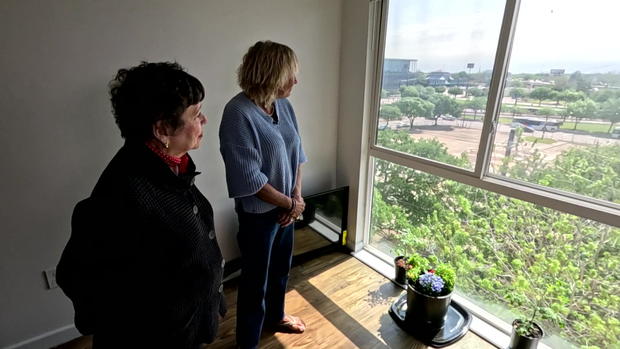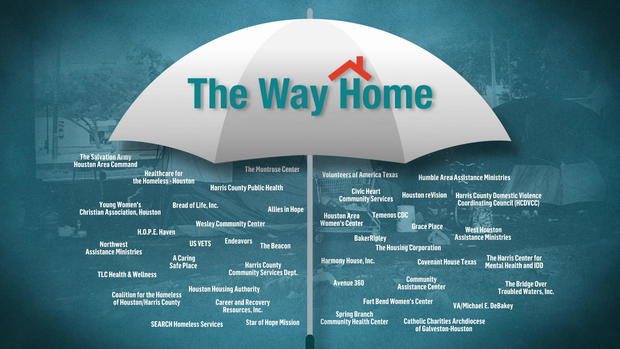Inside Houston's successful strategy to reduce homelessness
A lot of bad luck led 62-year-old Army veteran Julie Blow to homelessness – a serious kidney issues, a fall that cost her the sight in one eye, two surgeries. Blow couldn't work, and ran out of money.
And now? She has an apartment; brand-new furniture donated by a local retailer; and a TV. The 320-sq.-ft. studio is nothing fancy, but for Blow, it's a luxury after the tent where she had been living. "I feel like a teenager, I am that happy!" she said. "You know, before all the stuff happens to you in life and you get jaded? I feel like a teenager!"
For Houston, it's one more piece of evidence that its strategy for solving its homelessness problem works. Kelly Young, who heads Houston's Coalition for the Homeless, says it's a model that the rest of the nation should look at and follow. "We were one of the worst in the nation to begin with, in 2011, 2012," Young said. "And now, we're considered one of the best."
What happened? In 2012, the city went all-in on a concept called "Housing First." Since then, homelessness is down 63% in the greater Houston area, and more than 30,000 people have been housed.
Housing First means spend money on getting the unhoused into their own apartments, subsidize their rent, then provide the services needed to stabilize their lives – not fix the person first; not just add more shelter beds.
"Our natural instinct when we see homelessness increasing is to hire more outreach workers and to build more shelter beds," said Mandy Chapman Semple, the architect of Houston's success story. She now advises other cities on how to replicate it, among them Dallas, New Orleans, and Oklahoma City. "The idea that if you have no permanent place to live, that you're also going to be able to transform and tackle complex mental health issues, addiction issues, complex financial issues? It's just unrealistic."
- Colorado leaders travel to Houston to gain insight into homelessness
- Pittsburgh looks to Houston's "Housing First" policy in addressing homelessness
In Houston, step one was convincing dozens of unconnected agencies, all trying to do everything, to join forces under a single umbrella organization: The Way Home, run by the Houston Coalition for the Homeless.
So, for example, when outreach coordinators visit a homeless encampment, Jessalyn Dimonno is able to plug everything she learned into a system-wide database, logging in real time where people are staying.
Houston has dismantled 127 homeless encampments, but only after housing had been found for all of the occupants. So far this year, The Way Home has already housed more than 750 people. It helps that this city, unlike many, has a supply of relatively affordable apartments, and that it was able to use roughly $100 million in COVID aid to help pay for rentals, on top of its other homeless relief dollars.
But Houston's message is this: What's really essential to success is committing to homes, not just managing homelessness.
"What Houston has done for this country is, it's established a playbook that now allows any city to do the same, because we've proven that it can be done," Chapman Semple said.
For more info:
Story produced by Sara Kugel. Editor: Carol Ross.
See also:
- Addressing the ordeal of homelessness ("Sunday Morning")
- Homelessness on campus ("Sunday Morning")
- Record number of Americans are homeless amid nationwide surge in rent, report finds
- California voters approve Prop. 1, ballot measure aimed at tackling homeless crisis
- The fight against homelessness ("CBS Saturday Morning")






